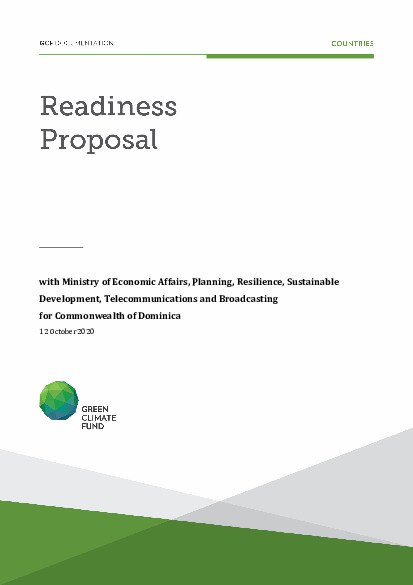Low Carbon Transport Dominica
The Commonwealth of Dominica is a SIDS vulnerable to climate change and heavily dependent on imported fossil fuels. The Nationally Determined Contribution has as target to reduce absolute Greenhouse Gas (GHG) emissions by 44.7% by 2030 compared to the emission level of 2014. The transport sector has the largest GHG emissions and is also the sector with the highest GHG growth. Transport emissions shall be reduced by 17% compared to the emission levels of 2014 (due to the strong growth of the transport sector the achievement of this target requires a 40-50% reduction of emissions compared to a Business as Usual trajectory).
Dominica will only be able to achieve its GHG transport target if the trend of increasing transport emissions can be reverted. A wide array of low-carbon transport measures is available including electric vehicles, low-carbon shipping, fostering of public transport, Non-Motorized transport etc. Gaps towards a viable low carbon transport strategy are related to (i) lack of a suitable database and transport / emission modelling (ii) lack of know-how and information to assess viable mitigation options for the transport sector (iii) lack of strategies and related policies to foster low carbon transport and (iv) financial and capacity knowledge gaps to implement low carbon transport strategies. At the same time Dominica is making important steps towards a green electricity production which could form the backbone for an electrified transport system in the country. The country has also given recently tax incentives to hybrid and electric cars.
The readiness support shall close these gaps by collecting data and modelling the transport sector (road as well as maritime), identifying and assessing low carbon transport options, formulating a low carbon transport roadmap and by accessing climate finance for implementation of low carbon transport measures. Activities shall be realized in cooperation with local partners and stakeholders to create awareness and capacity on low carbon transport. GCF support is critical to enable Dominica to formulate and implement a strategic framework for low carbon transport. The capacity building on modelling methods and analytical instruments to assess low carbon options creates a sustainable impact also for future endeavors in this area.
Deliverables include a transport emission inventory and model, a report on low carbon transport options for Dominica including an in-depth assessment of the most promising options, a low carbon transport roadmap, and a GCF finance proposal for low carbon transport.
Direct beneficiaries of the readiness support are government institutions and private sector actors and other stakeholders involved in transport policies and transport services. When the project is implemented there will be a wider net of beneficiaries. Air quality is a public good and improving air quality through low-emission transport systems improves the health and well-being of all citizens. Reduced reliance on fossil fuel imports also improves the resilience of the country towards external shocks and fuel delivery disruptions. Direct beneficiaries of the readiness support are government institutions and private sector actors involved in transport policies and transport services through improved knowledge on options, policies and business models for low-carbon transport.
The readiness support shall be implemented by the NDA.
